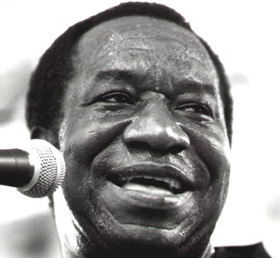Blog December 2, 2013
Tabu Ley Rochereau: A History in Six Tracks
Over the past weekend, the world lost a truly great artist, and one of the pioneers of Congolese popular music: Born Pascal-Emmanuel Sinamoyi Tabu on Nov. 13, 1940, he left the world as Tabu Ley Rochereau on Nov. 30, 2013. When an artist is described as "prolific" it rarely means this prolific: Tabu Ley Rochereau is reputed responsible for as many as 3,000 songs and 250 albums of music, and 68 children (by different women, bien sur). In homage to the man, we won't even try to pick his "best" six tracks, but rather six tracks that exemplify different eras of Tabu Ley's career. This is just the briefest taste of "The Voice of Lightness." We encourage you to dig deeper!
1) Tabu Ley got his start singing with Joseph "Le Grande Kallé" Kabaselleh, one of the fathers of Congolese popular music. Kallé's band, l' African Jazz, contained many future icons of African music, including the amazing guitarist and frequent Tabu Ley collaborator Dr. Nico Kasanda, and Manu Dibango.
This track, "Independance Cha Cha," was composed in 1960 by Le Grande Kallé in celebration of the Congo's independence from Belgium, but it was sung by Tabu Ley, and it lodged his voice permanently in the ear of the Congolese public:
http://youtu.be/0y6BjNJD0ZM
2) In 1963, Tabu Ley and Dr. Nico left l'African Jazz to form their own band, l'Orchestre African Fiesta. At first, they continued developing their own style of Congolese rumba, into which they incorporated even more Cuban influence, including covering some Cuban songs, and singing in (highly locally inflected) Spanish as well as French and Lingala. For example "Paquita":
http://youtu.be/2TJBvqI2MZQ
3) Before (and after) Tabu Ley and Dr. Nico parted ways to lead their own bands under the names African Fiesta National and African Fiesta Sukisa respectively, they pioneered a new sound in Congolese popular music: soukous. It took a while for this new style to mature, and the development included Tabu Ley's experiments with funk and soul, an example of which can be heard in this song, "Aon Aon:"
http://youtu.be/u2VXjfUpPT0
4) In 1970, Tabu Ley founded a new band l'Orchestre Afrisa International, named for the African continent and for his own record label (Editíons Isa). Tabu's fame grew, and his music matured: with the new band, and with time, his soukous developed into an uptempo dance music, exemplified in this song "Ponce Pilate" from 1977:
http://youtu.be/BvWxLfMsavA
Check out Tabu Ley's remake of this same song in 1994 to see how his innovations developed into the immensely popular modern styles of soukous.
5) In the 1980s, Tabu Ley worked with various female singers, including M'bilia Bel, whom he married in 1987. Their work together, and Bel's popularity, kept Afrisa International fresh, alive and growing in popularity. Here's a good example of their work together, "Cadence Mudanda" although only Bel appears in the music video:
http://youtu.be/WjjJgqtlOYU
6) Tabu Ley eventually fell out of favor with dictator Mobuto Sese Seko, so in 1988, he went into exile in France. In the 1990s, Tabu Ley spent some time on west coast of the U.S. His popularity in the Congo began to wane in the late '80s and early 1990s, but he continued to perform internationally. He produced a couple of notable albums in 1994: a remake of many of his hits, Africa Worldwide: 35 Year Anniversary, and his first official U.S. release, Muzina. On the title track, you can hear light elements of the sebene style that was sweeping the Congo in the 1990s:
http://youtu.be/OPgqdGJyoi4
After the fall of Mobutu in 1997, Tabu Ley returned to the Congo, where he served in various political positions including Vice-Governor of Kinshasa and provincial Minister of Culture for the next decade. He passed away last Saturday, Nov. 30, 2013, in Brussels, Belgium.









